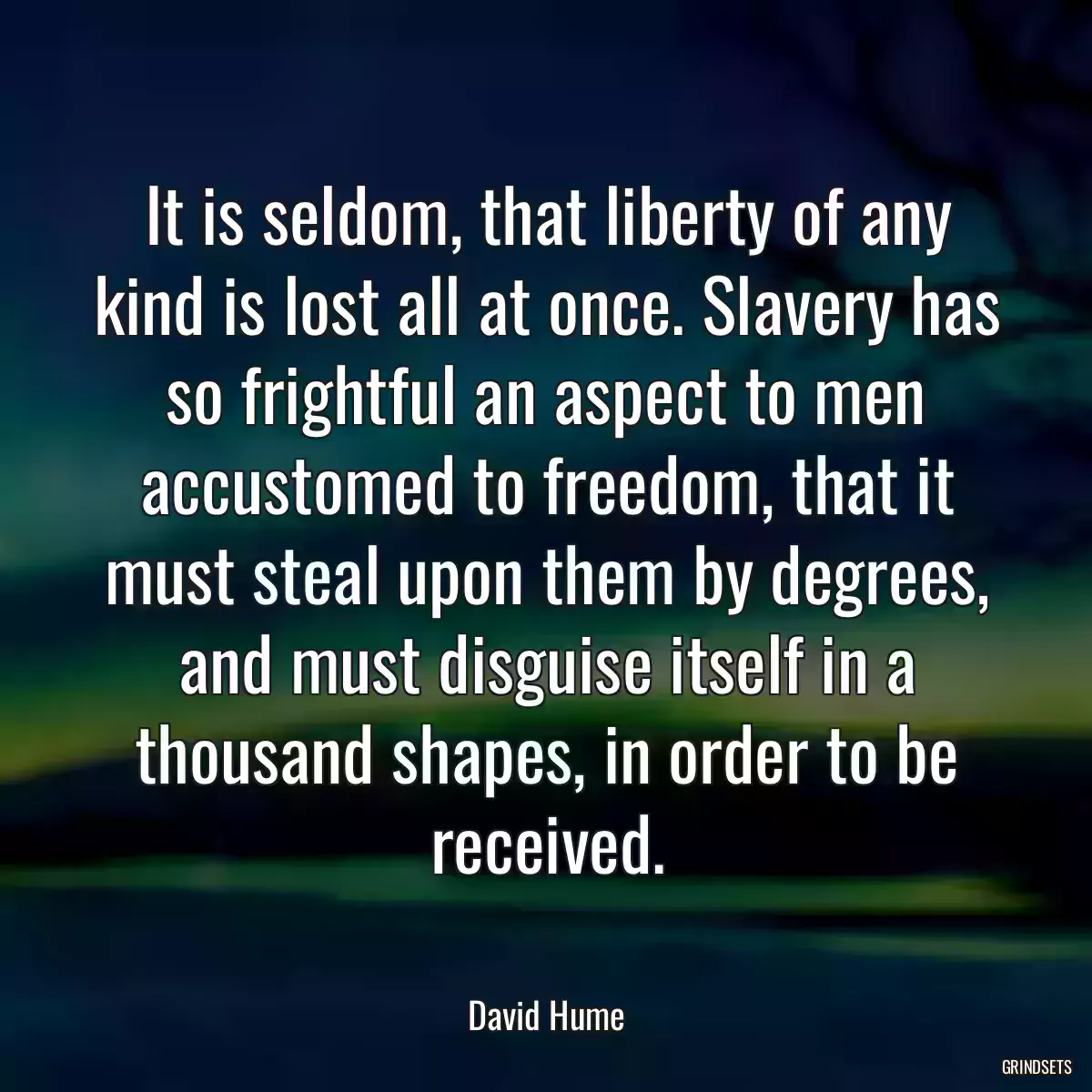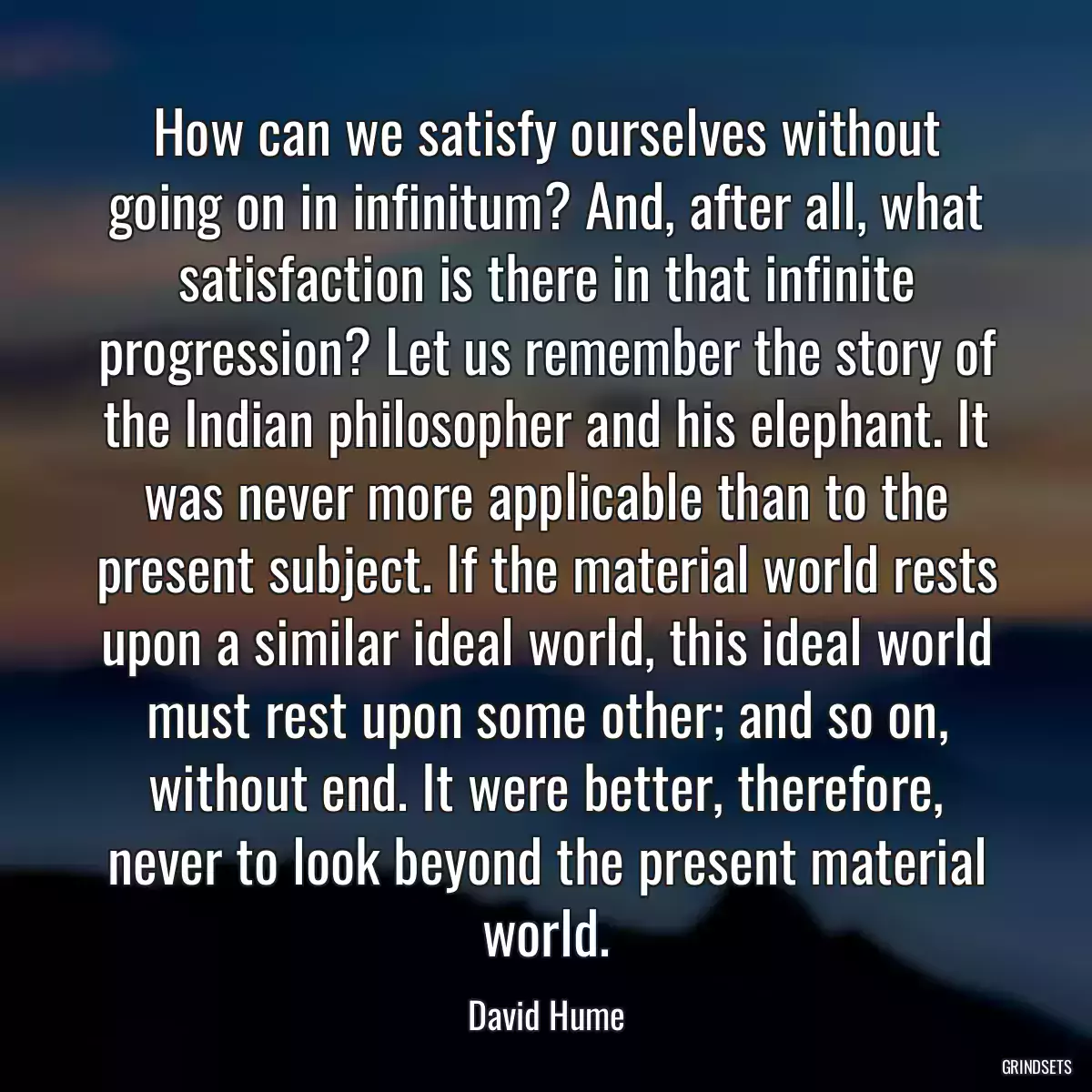
Quotes David Hume - page 3
Find dozens of David Hume with images to copy and share.

Riches are valuable at all times, and to all men, because they always purchase pleasures such as men are accustomed to and desire; nor can anything restrain or regulate the love of money but a sense of honor and virtue, which, if it be not nearly equal at all times, will naturally abound most in ages of knowledge and refinement.
Every movement of the theater by a skilful poet is communicated, as it were, by magic, to the spectators; who weep, tremble, resent, rejoice, and are inflamed with all the variety of passions which actuate the several personages of the drama.
I may venture to affirm the rest of mankind, that they are nothing but a bundle or collection of different perceptions, which succeed each other with an inconceivable rapidity, and are in a perpetual flux and movement.
You may also like
Let us become thoroughly sensible of the weakness, blindness, and narrow limits of human reason: Let us duly consider its uncertainty and endless contrarieties, even in subjects of common life and practice.... When these topics are displayed in their full light, as they are by some philosophers and almost all divines; who can retain such confidence in this frail faculty of reason as to pay any regard to its determinations in points so sublime, so abstruse, so remote from common life and experience?
'Tis certain that a serious attention to the sciences and liberal arts softens and humanizes the temper, and cherishes those fine emotions in which true virtue and honor consist. It rarely, very rarely happens that a man of taste and learning is not, at least, an honest man, whatever frailties may attend him.
[priests are] the pretenders to power and dominion, and to a superior sanctity of character, distinct from virtue and good morals.
In all ages of the world, priests have been enemies to liberty; and it is certain, that this steady conduct of theirs must have been founded on fixed reasons of interest and ambition. Liberty of thinking, and of expressing our thoughts, is always fatal to priestly power, and to those pious frauds, on which it is commonly founded; and, by an infallible connexion, which prevails among all kinds of liberty, this privilege can never be enjoyed, at least has never yet been enjoyed, but in a free government.
Liberty of thinking, and of expressing our thoughts, is always fatal to priestly power, and to those pious frauds on which it is commonly founded.

Heroism, or military glory, is much admired by the generality of mankind. They consider it as the most sublime kind of merit. Menof cool reflection are not so sanguine in their praises of it.
[The sceptic] must acknowledge, if he will acknowledge any thing, that all human life must perish, were his principles to prevail.All discourse, all action would immediately cease, and men remain in a total lethargy, till the necessities of nature, unsatisfied, put an end to their miserable existence.
A man who has cured himself of all ridiculous prepossessions, and is fully, sincerely, and steadily convinced, from experience as well as philosophy, that the difference of fortune makes less difference in happiness than is vulgarly imagined; such a one does not measure out degrees of esteem according to the rent-rolls of his acquaintance. ... his internal sentiments are more regulated by the personal characters of men, than by the accidental and capricious favors of fortune.
Friendship is a calm and sedate affection, conducted by reason and cemented by habit; springing from long acquaintance and mutual obligations, without jealousies or fears, and without those feverish fits of heat and cold, which cause such an agreeable torment in the amorous passion.
Moving from an objective statement of fact to a subjective statement of value does not work, because it leaves open questions that have not been answered.
Tis evident that all reasonings concerning matter of fact are founded on the relation of cause and effect, and that we can never infer the existence of one object from another, unless they be connected together, either mediately or immediately... Here is a billiard ball lying on the table, and another ball moving toward it with rapidity. They strike; and the ball which was formerly at rest now acquires a motion. This is as perfect an instance of the relation of cause and effect as any which we know, either by sensation or reflection.
The more instances we examine, and the more care we employ, the more assurance shall we acquire, that the enumeration, which we form from the whole, is complete and entire.
We have no other notion of cause and effect, but that of certain objects, which have always conjoin'd together, and which in all past instances have been found inseparable. We cannot penetrate into the reason of the conjunction. We only observe the thing itself, and always find that from the constant conjunction the objects acquire an union in the imagination.
You may also like

How can we satisfy ourselves without going on in infinitum? And, after all, what satisfaction is there in that infinite progression? Let us remember the story of the Indian philosopher and his elephant. It was never more applicable than to the present subject. If the material world rests upon a similar ideal world, this ideal world must rest upon some other; and so on, without end. It were better, therefore, never to look beyond the present material world.
We may observe that, in displaying the praises of any humane, beneficent man, there is one circumstance which never fails to be amply insisted on, namely, the happiness and satisfaction, derived to society from his intercourse and good offices.